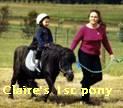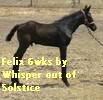Hyperthermia in Horses










Hyperthermia (heat exhaustion and heatstroke) is generally
not a common problem in horses. Horses usually adapt well
to the changing conditions of high humidity and heat.
Symptoms you should look for in the horse are weakness, rapid
breathing, pan ting ,trembling or twitching muscles and finally
collapse. The horse's temperature and heart rate will usually
be higher than normal and he will be sweating profusely.
The onset of heat exhaustion is usually gradual and may
occur anytime. Take caution during workouts and exercising
your horse in extremely hot conditions. (Read more below
under prevention.)
A more serious problem than heat exhaustion is heatstroke.
Whereas heat exhaustion is very gradual, the onset of
heatstroke occurs quite rapidly. The horses body temperature
is much higher than that of a horse with heat exhaustion
and the temp can get as high as (115 F). A vacant and staring
expression may or may not be present. The horse STOPS sweating!
During heatstroke your horse which was sweating profusely,
rapidly dries. Coat hairs will stand on end; this occurrence
indicates a severe breakdown of the horse's cooling system.
In this case it may rapidly lead to death of the horse.
Prevention: A few common-sense horse management guidelines
should be in place. The horse should have free access to
shade, whether it is a tree or in a stall, shade is a horses
best friend during hot and humid weather. Make sure your horse
is in proper condition & physically fit for exercise and work
in hot & humid weather conditions. A good rule of thumb is
shorter exercise periods with allot of walk breaks in between.
These breaks give the horse's cooling system time to work and
you time for observation of the your horse's condition. Try and
take advantage of the cooler morning and late evening work-outs.
Access to fresh, clean water is a necessity (unless the horse
is hot from exercise). Remember a horse can loose up to 2 1/2
to 3 1/2 gallons of sweat per work session. Salt, potassium
and chloride levels drop also so keep this in mind. Make sure
your horses have free access to a mineral salt block as this
will help replace lost minerals and keep the horse in balance.
First Aid: Hyperthermia is a medical emergency! First and
foremost it is important to lower your horses body temperature;
spray your horse with slightly cool or tepid water. Get the
horse into the shade, keep him moving slowly to allow for
circulation of air over the his/ her body. (if you have a fan,
use it).
Secondly have someone call your veterinarian immediately!
Do not stop and call your veterinarian as this may be fatal
for your horse, if you are alone at this time, wait until your
horse is out of immediate danger before you leave to phone your
veterinarian.
 . . . .
. . . . 
 BACK TO Jodie Rowan: Hillside Performance Horses
BACK TO Jodie Rowan: Hillside Performance HorsesTerms of Use | Privacy Policy |Disclaimer

Comments for Hyperthermia in Horses
|
||
|
||
the A to Z directory of dealing with Health Problems & Self Care Strategies for natural remedies to your health issues.

Subscribe to get your weekly "Health Success Magazine" with a new complete & comprehensive Health Report in every edition!

to “Your Health Success”
our weekly F’R’E’E’ Newsletter
If you would like a free no-obligation private consultation or to contact Warren Tattersall for more information, please click here >> Contact Us

Click the books above to learn more about how we treat CFS naturally, to get your life back!
You will find many assorted Health Reports available for download free to you on this website!
Our free Health Success Reports are each available for you to download when you subscribe to receive them and their 7 part eCourse.
You can unsubscribe at any time, but we are sure you will want to receive all the email lessons of these informative ecourses.
Read more HERE to select the REPORT subjects of most interest (or concern) to you.







